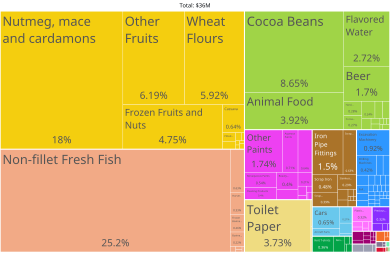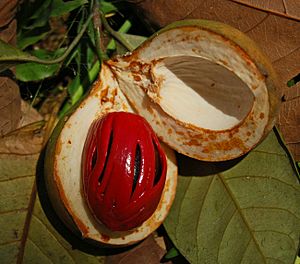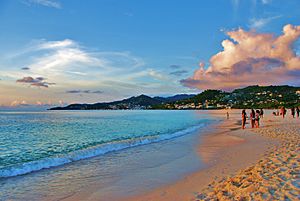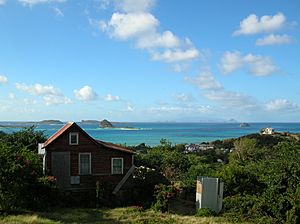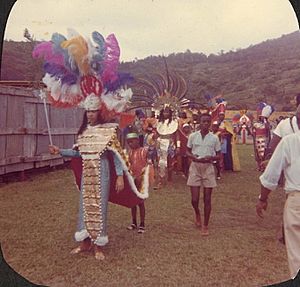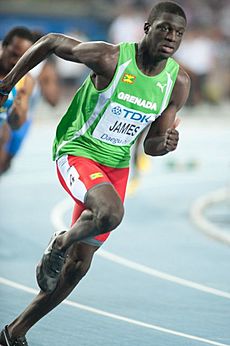Grenada facts for kids
Quick facts for kids
Grenada
Gwenad (Grenadian Creole French)
Gwenad (Grenadian Creole English) |
|
|---|---|
|
|
|
|
Motto: "Ever Conscious of God We Aspire, Build and Advance as One People"
|
|
|
Anthem: "Hail Grenada"
|
|
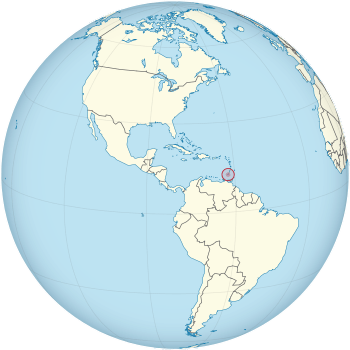 |
|
| Capital and largest city
|
St. George's 12°03′N 61°45′W / 12.050°N 61.750°W |
| Official languages | |
| Recognised regional languages |
|
| Ethnic groups
(2020)
|
|
| Religion
(2020)
|
|
| Demonym(s) | Grenadian |
| Government | Unitary parliamentary constitutional monarchy |
|
• Monarch
|
Charles III |
| Cécile La Grenade | |
| Dickon Mitchell | |
| Legislature | Parliament |
| Senate | |
| House of Representatives | |
| Formation | |
|
• Associated State
|
3 March 1967 |
|
• Independence from the United Kingdom
|
7 February 1974 |
|
• Grenadian Revolution
|
13 March 1979 |
|
• Constitution Restoration
|
4 December 1984 |
| Area | |
|
• Total
|
348.5 km2 (134.6 sq mi) (185th) |
|
• Water (%)
|
1.6 |
| Population | |
|
• 2018 estimate
|
111,454 (179th) |
|
• Density
|
318.58/km2 (825.1/sq mi) (45th) |
| GDP (PPP) | 2023 estimate |
|
• Total
|
|
|
• Per capita
|
|
| GDP (nominal) | 2023 estimate |
|
• Total
|
|
|
• Per capita
|
|
| HDI (2022) | high · 73rd |
| Currency | East Caribbean dollar (XCD) |
| Time zone | UTC−4 (AST) |
| Driving side | left |
| Calling code | +1-473 |
| ISO 3166 code | GD |
| Internet TLD | .gd |
|
|
Grenada (grə-NAY-də) is an island country in the Caribbean Sea. It is part of the West Indies and is located at the southern end of the Grenadines island chain. Grenada includes the main island of Grenada, plus two smaller islands called Carriacou and Petite Martinique. Several tiny islands to the north are also part of Grenada.
This country is found northwest of Trinidad and Tobago and southwest of Saint Vincent and the Grenadines. Grenada is about 348.5 square kilometers (132.8 square miles) in size. In July 2020, its population was estimated to be around 112,523 people. The capital city is St. George's. Grenada is also known as the "Island of Spice" because it produces a lot of nutmeg and mace.
Before Europeans arrived, indigenous peoples from South America lived on Grenada. Christopher Columbus saw the island in 1498 during his third trip to the Americas. European attempts to settle the island were difficult due to resistance from the Island Caribs. However, French settlement began in 1649 and lasted for about a century.
In 1763, Grenada became a British territory under the Treaty of Paris. British rule continued until 1974, except for a short time when the French took over between 1779 and 1783. Grenada gained full control over its internal affairs in 1967. It was also part of the West Indies Federation from 1958 to 1962.
Grenada became an independent country on February 7, 1974. Eric Gairy became its first prime minister. The country joined the Commonwealth of Nations, with Queen Elizabeth II as its head of state. In 1979, a group called the New Jewel Movement took over the government without violence. They formed the People's Revolutionary Government (PRG), led by Maurice Bishop.
Later, Bishop was arrested and executed. This led to an invasion by the U.S. and other Caribbean countries in October 1983. Since then, Grenada has returned to a parliamentary democracy. It has been politically stable ever since.
Contents
The Name of Grenada
The name "Grenada" likely comes from the Spanish city of Granada. Spanish maps from the 1520s used the name "Granada" for the island. They also called the islands to the north Los Granadillos, meaning "Little Granadas". Even though the Spanish claimed the islands, they never tried to settle Grenada.
When the French settled the island in 1649, they kept the name as "La Grenade". In 1763, when the British took over, they changed it to "Grenada". This was one of many names they changed to sound more English.
Earlier Names
Christopher Columbus gave the island its first European name in 1498. He called it "La Concepción" to honor the Virgin Mary. Some say he might have named it "Assumpción," but it's not certain. He supposedly saw both Grenada and Tobago from a distance and named them at the same time. It is now accepted that he named Tobago "Assumpción" and Grenada "La Concepción."
A year later, explorer Amerigo Vespucci reportedly renamed the island "Mayo." However, this name only appears on one map. The native Arawak people who lived on the island before the Europeans called it Camajuya.
Government and Politics
Grenada is a constitutional monarchy. This means it has a king or queen as head of state, but their power is limited by a constitution. Currently, Charles III is the monarch, and he is represented in Grenada by a governor-general.
The real power lies with the prime minister, who is the head of government. The governor-general's role is mostly ceremonial. The prime minister is usually the leader of the party with the most seats in Parliament.
Grenada's Parliament has two parts: the Senate and the House of Representatives. The Senate has 13 members, chosen by the government and the opposition. The House of Representatives has 15 members, who are elected by the people for five-year terms. Grenada has a multi-party system, meaning several political parties compete for power. The main parties are the New National Party (NNP) and the National Democratic Congress (NDC).
Economy
Grenada has a small economy. Tourism is the most important part, bringing in a lot of money from other countries. The country shares a central bank and currency, the East Caribbean dollar, with seven other islands. These islands are part of the Organisation of Eastern Caribbean States (OECS).
Farming and Exports
Grenada exports many different spices. The most famous is nutmeg, which is even shown on the national flag. Mace is another important spice export. Other major exports include bananas, cocoa, fruits, vegetables, clothing, chocolate, and fish.
Tourism in Grenada
Tourism is key to Grenada's economy. Many visitors come for the beaches and water sports. These activities are mostly found around St. George's, the capital city. Ecotourism, which focuses on nature and being environmentally friendly, is also growing. Many small guesthouses for ecotourists are in the Saint David and Saint John parishes.
The tourism industry is growing a lot. A large pier for cruise ships and a new walkway are being built. Grenada has many beautiful beaches. Grand Anse Beach in St. George's is about 3 kilometers (1.9 miles) long. It is often called one of the best beaches in the world.
Grenada's many waterfalls are also popular with tourists. The Annandale Waterfalls are closest to St. George's. Other famous waterfalls like Mt. Carmel, Concord, Seven Sisters, and Tufton Hall are also easy to reach.
Several festivals attract tourists. These include the Carriacou Maroon and String Band Music Festival in April. There is also the Annual Budget Marine Spice Island Billfish Tournament. Other popular events are the Island Water World Sailing Week and the Grenada Sailing Festival Work Boat Regatta.
Transportation
Maurice Bishop International Airport is Grenada's main airport. It connects the country to other Caribbean islands, the United States, Canada, and Europe. There is also another airport on the island of Carriacou.
People and Culture
Most Grenadians (82%) are descendants of enslaved Africans. Only a few of the native Carib and Arawak people survived after the French arrived. A small number of people from India came to Grenada between 1857 and 1885 to work. Today, Grenadians of Indian descent make up 2.2% of the population. There are also small groups of French and English descendants. The rest of the population (13%) is of mixed heritage.
Many young Grenadians move to other countries to find more opportunities. They often go to other Caribbean islands like Barbados. Many also move to North American cities like New York City, Toronto, and Montreal. Some go to the United Kingdom, especially London and Yorkshire.
Religion
Religion in Grenada (2011 estimate) Protestant (49.2%) Roman Catholic (36%) none (5.7%) unspecified (1.3%) Jehovah's Witness (1.2%) Rastafari (1.2%) other (5.5%)
Most people in Grenada are Christian. In 2011, about 49.2% were Protestant and 36% were Roman Catholic. Other religions include Hinduism and Rastafari. Some people also have no religion.
Languages
English is the official language of Grenada. However, most people speak one of two creole languages. These are Grenadian Creole English and, less often, Grenadian Creole French. These languages mix African, French, and English words. Grenadian Creole French is mostly spoken in smaller country areas.
Some people of Indian descent still use a few Hindi or Bhojpuri words. The original native languages of the island were Iñeri and Karina (Carib).
Culture
Grenada's culture is strongly shaped by the African heritage of most Grenadians. It also shows the long history of British colonial rule. While French influence is less obvious than on some other Caribbean islands, French surnames and place names remain. The local Creole language also has many French words.
You can see stronger French influence in the spicy food, which is similar to cooking styles in New Orleans. Some French architecture from the 1700s can still be found. Indian and Carib Amerindian influences are also present, especially in the island's food.
Oil down, a stew, is considered the national dish. It's cooked in coconut milk until the milk is absorbed, leaving a bit of coconut oil. Traditional recipes include salted pigtail, pig's feet, salt beef, chicken, and dumplings. Vegetables like breadfruit, green banana, yam, and potatoes are also added. Callaloo leaves are sometimes used for extra flavor and to keep in the steam.
Soca, calypso, and reggae are popular music styles. They are played at Grenada's yearly Carnival. Rap music has also become popular among young Grenadians. There are many young rappers in the island's underground rap scene. Zouk music is also slowly becoming more common.
An important part of Grenadian culture is storytelling. Many folk tales have both African and French influences. The character Anansi, a spider who is a trickster, came from West Africa. He is also popular on other islands. French influence can be seen in La Diablesse, a well-dressed she-devil, and Loogaroo (from "loup-garou"), a werewolf.
Sports
Olympics
Grenada has participated in every Summer Olympics since the 1984 Summer Olympics in Los Angeles. Kirani James is a famous Grenadian sprinter. He won Grenada's first Olympic gold medal in the men's 400 meters at the 2012 Summer Olympics in London. He also won a silver medal in the men's 400 meters at the 2016 Summer Olympics in Rio de Janeiro. At the 2020 Summer Olympics in Tokyo, he won a bronze medal.
Cricket
Cricket is the national and most popular sport in Grenada, just like on other Caribbean islands. It is a big part of Grenadian culture. The Grenada national cricket team plays as part of the Windward Islands cricket team in regional games. It also plays as a separate team in smaller regional matches.
The Grenada National Cricket Stadium in St. George's hosts both local and international cricket matches. Devon Smith, a record holder for the West Indies, was born in Hermitage.
In April 2007, Grenada helped host the 2007 Cricket World Cup along with other Caribbean nations. After Hurricane Ivan, the government of China paid for and helped build the new $40 million national stadium.
Football
Football is also a very popular sport in Grenada.
Images for kids
-
Maurice Bishop visiting East Germany, 1982
-
Members of the Eastern Caribbean Defence Force during the 1983 invasion of Grenada
-
An aerial photo of the capital St. George's
See also
 In Spanish: Granada (país) para niños
In Spanish: Granada (país) para niños




